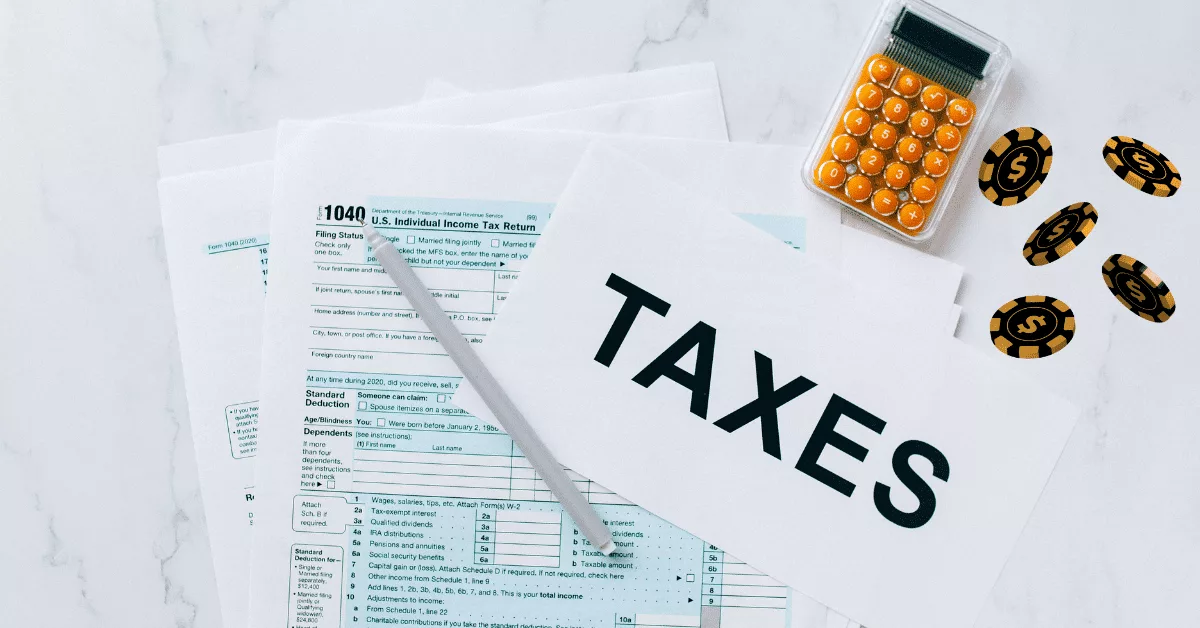
Gambling has long been a source of excitement and entertainment for many, with casinos offering a chance at both fortune and thrill. However, beyond the allure of jackpots and poker tables lies a realm of taxation that can confound even the most seasoned gamblers.
As the saying goes, “the house always wins,” but what about when luck isn’t on your side? Can you use casino losses on your taxes? In this blog post, we delve into the intricacies of navigating the intersection between gambling and taxation.
Understanding the nuances of reporting winnings, losses, and the importance of accurate record-keeping is not only crucial for complying with tax regulations but may also offer a silver lining for those whose dice rolls haven’t been as fortunate.
Join us as we explore the landscape of using casino losses on taxes, unraveling the complexities to help you make informed decisions when it comes time to file your returns.
Can You Use Casino Losses On Taxes?
Yes, under certain circumstances, you can use casino losses to offset your taxable income on your taxes. However, there are specific criteria and limitations set by the Internal Revenue Service (IRS) that you need to consider.
- Itemizing Deductions: To claim casino losses, you must itemize your deductions on Schedule A of your Form 1040 instead of taking the standard deduction. This means detailing your eligible expenses, including gambling losses.
- Limited to Gambling Winnings: You can only deduct gambling losses up to the amount of your gambling winnings. You cannot use losses to create a net tax loss, and you cannot offset other types of income with excess losses.
- Documentation Requirements: Accurate record-keeping is crucial. You need to maintain detailed records of your gambling activities, including dates, types of gambling, locations, and amounts won and lost. Lack of proper documentation can lead to the disallowance of the deduction.
- Professional Gambling Considerations: If you are a professional gambler, additional rules may apply. The IRS has specific guidelines for individuals engaged in gambling as a trade or business, and deductions may extend to a broader range of business-related expenses.
It’s important to consult with a tax professional to ensure that you meet all the necessary criteria and comply with tax regulations. Understanding the rules and keeping meticulous records of your gambling activities will help you make informed decisions when it comes time to file your tax returns.
Gambling Income
Taxable Gambling Income
When the dice tumble in your favor or the slot machine bells ring, it’s easy to get caught up in the exhilaration of a gambling win. Yet, as the adage goes, “with great fortune comes great responsibility,” and that responsibility extends to the taxman. Understanding taxable gambling income is a crucial step in navigating the intricate world where gaming intersects with taxation. Taxable gambling income encompasses more than just the pile of chips you amass at the blackjack table or the jackpot from a lucky spin. It extends to various forms of winnings, including but not limited to:
- Casino Winnings: The most obvious source, these include winnings from slot machines, poker, blackjack, roulette, and other casino games.
- Lottery Winnings: If you’re one of the lucky few who hits the jackpot with a lottery ticket, those winnings are generally considered taxable income.
- Betting and Wagering: This category includes winnings from sports betting, horse racing, and other forms of wagering.
- Online Gambling: In the digital age, online casinos and sportsbooks have become prevalent. Winnings from these platforms are also subject to taxation.
It’s important to note that not all gambling income is treated equally. The Internal Revenue Service (IRS) has specific rules and thresholds for reporting different types of winnings. Failing to accurately report taxable gambling income can result in penalties, making it imperative to understand the scope of what constitutes taxable income in the realm of gambling. In the following sections, we’ll further explore the distinctions between winnings and losses and the vital role of accurate record-keeping in navigating the tax implications of your gambling endeavors.
Differentiating Between Winnings And Losses
In the realm of gambling, the boundary between thrilling wins and disappointing losses is often a precarious one. However, when it comes to tax reporting, precision in distinguishing between these outcomes becomes imperative. The Internal Revenue Service (IRS) expects individuals to provide an accurate account of their financial gains and losses from gambling activities to ensure compliance with tax regulations.
- Winnings: Cash payouts, a common form of winnings, encompass any cash received directly from a casino or other gambling establishment. Non-cash prizes, such as cars or vacations, and complimentary items provided by the casino also fall under the category of winnings. Furthermore, striking it big on a slot machine, poker tournament, or any other game results in a jackpot, which constitutes taxable winnings.
- Losses: On the flip side, losses encompass various aspects. Betting expenses, representing the money spent on wagers, bets, or lottery tickets, are considered losses. Additionally, costs directly related to the act of gambling, such as travel expenses to a casino or fees associated with online gambling platforms, are part of your overall losses. It’s essential to note that while you can offset your winnings with documented gambling losses, these losses cannot exceed your total winnings for tax purposes.
Accurate record-keeping forms the bedrock of this differentiation process. Whether meticulously logging each hand at the poker table, keeping a detailed record of slot machine sessions, or tracking online bets, maintaining comprehensive records ensures you have the necessary evidence to distinguish between winnings and losses when it’s time to fulfill your tax obligations. In the next section, we’ll delve into the critical importance of accurate record-keeping and how it serves as an indispensable foundation for navigating the complexities of reporting gambling income to the IRS.
Accurate Record-keeping
The importance of accurate record-keeping in the realm of gambling and taxation cannot be overstated. Precise and comprehensive records serve as the foundation for navigating the complexities of reporting gambling income to the Internal Revenue Service (IRS). Here are key reasons why accurate record-keeping is crucial:
- Substantiating Winnings and Losses: Accurate records provide the necessary evidence to substantiate both winnings and losses. When the IRS scrutinizes your tax return, having a detailed log of your gambling activities ensures transparency and credibility. This becomes especially crucial when differentiating between the exhilarating wins and the inevitable losses incurred during gambling endeavors.
- Compliance with Tax Regulations: The IRS expects individuals to comply with tax regulations and accurately report their financial activities. By maintaining thorough records, you demonstrate a commitment to fulfilling your tax obligations. This not only reduces the likelihood of audits and penalties but also establishes your credibility in the eyes of tax authorities.
- Offsetting Winnings with Losses: Accurate record-keeping enables you to offset your taxable winnings with documented losses, a process that is integral to determining your net gambling income. Without a detailed record of losses, you may miss out on potential deductions, resulting in higher taxable income than necessary.
- Facilitating Professional Assistance: In the event of complex tax situations or audits, having well-documented records facilitates the work of tax professionals. Whether you seek advice from a tax consultant or accountant, providing them with a clear and organized record of your gambling activities streamlines the process of assessing your tax liability.
- Planning for Future Tax Filings: Comprehensive records not only serve the immediate purpose of accurate tax reporting but also aid in planning for future filings. Trends in your gambling activities can be identified, allowing for strategic decisions to optimize deductions and minimize tax liabilities in subsequent years.
Overall, accurate record-keeping is not just a good practice; it’s a fundamental requirement for anyone engaged in gambling activities. It empowers individuals to fulfill their tax obligations, maximize allowable deductions, and navigate the intricate intersection between gambling and taxation with confidence.
Deducting Casino Losses
Criteria For Deducting Casino Losses
Deducting casino losses on your taxes is a possibility, but understanding the criteria for eligibility is essential to ensure compliance with Internal Revenue Service (IRS) regulations. Here are the key criteria you should be aware of when considering deductions for casino losses:
- Itemizing Deductions: To deduct casino losses, you must itemize your deductions instead of taking the standard deduction. This means detailing your eligible expenses, including gambling losses, on Schedule A of your Form 1040 tax return. Itemizing can be more beneficial if your total deductions exceed the standard deduction amount.
- Limited to Gambling Winnings: The IRS allows you to deduct gambling losses only up to the amount of your gambling winnings. You cannot use losses to create a tax loss or offset other income. Your total gambling losses should not surpass the total amount of your reported gambling winnings.
- Documentation and Proof: Detailed and accurate record-keeping is crucial. You need to provide evidence of your gambling losses, including receipts, tickets, or a comprehensive gambling log. The documentation should clearly outline the date, type of gambling activity, location, and amounts involved. Without proper documentation, your deduction claim may be challenged in the case of an audit.
- Professional Advice: Seeking professional advice from a tax consultant or accountant is advisable, especially if your gambling activities involve substantial sums. A tax professional can help ensure that you meet all the criteria for deducting losses and maximize your eligible deductions while staying within the bounds of tax laws.
- Consistency in Reporting: Consistency in reporting is key. Ensure that your approach to reporting gambling losses remains consistent from year to year. Any changes in your reporting practices could raise red flags during an IRS review.
- Differentiating Between Casual and Professional Gambling: If you engage in gambling as a profession, a different set of rules may apply. Professional gamblers may be able to deduct a broader range of business-related expenses. Understanding the distinction between casual and professional gambling is crucial for accurate tax reporting.
Understanding and adhering to these criteria is fundamental to successfully deducting casino losses on your taxes. It’s important to note that tax laws can change, so staying informed and seeking professional advice can help ensure you navigate the complexities of gambling-related tax deductions effectively.
Limits And Restrictions On Deductibility
When it comes to deducting casino losses on your taxes, it’s crucial to be aware of specific limits and restrictions imposed by the Internal Revenue Service (IRS). Understanding these constraints will help ensure that you navigate the tax implications accurately and in compliance with tax regulations. Here are the key limits and restrictions on the deductibility of casino losses:
- Deduction Limited to Gambling Winnings: The deduction for casino losses is restricted to the amount of your gambling winnings. You cannot use losses to create a net loss for tax purposes, and you are not allowed to offset other types of income with excess losses. If your losses surpass your winnings, you cannot carry over the excess losses to future tax years.
- Itemizing Deductions: To claim the deduction for casino losses, you must itemize your deductions on Schedule A of your Form 1040. This means that your total itemized deductions, which include gambling losses, must exceed the standard deduction for your filing status to be beneficial.
- Overall Limitation on Itemized Deductions: There is an overall limitation on itemized deductions for high-income taxpayers. If your adjusted gross income (AGI) surpasses a certain threshold, your total itemized deductions, including gambling losses, may be reduced.
- Professional Gambling Considerations: Professional gamblers have specific rules and considerations. If you engage in gambling as a profession, the IRS may apply different rules, and deductions may extend to a broader range of business-related expenses. However, meeting the criteria for professional gambling can be challenging.
- Strict Documentation Requirements: The IRS requires meticulous documentation to support your deduction claim. Keep detailed records of your gambling activities, including dates, types of gambling, locations, and amounts won and lost. Proper documentation is crucial, and failure to meet these requirements can lead to the disallowance of the deduction.
- Alternative Minimum Tax (AMT) Impact: The Alternative Minimum Tax (AMT) can affect the benefits of certain deductions, including gambling losses. Taxpayers subject to AMT may find that some deductions, such as gambling losses, are less advantageous under the AMT rules.
Being mindful of these limits and restrictions is essential for accurate tax reporting. If you have complex financial situations or uncertainties, consulting with a tax professional is recommended. They can provide personalized guidance based on your specific circumstances, ensuring that you navigate the complexities of deducting casino losses in accordance with tax laws.
Required Documentation For Claiming Losses
When it comes to claiming losses from casino activities on your taxes, meticulous documentation is key. The Internal Revenue Service (IRS) has specific requirements for substantiating gambling losses, and failure to provide adequate documentation could result in the disallowance of your deduction. Here’s a comprehensive list of the required documentation for claiming losses:
- Betting Logs or Diaries: Maintain a detailed log or diary of your gambling activities. Include dates, types of gambling, locations, and amounts wagered and won or lost. This log serves as a crucial piece of evidence for the IRS.
- Wagering Tickets and Receipts: Keep copies of wagering tickets, canceled checks, credit card records, and receipts related to your gambling activities. These documents provide tangible evidence of your bets and losses.
- Casino Statements and Win/Loss Statements: Obtain statements from casinos and other gambling establishments. Some casinos provide Win/Loss statements summarizing your overall activity, which can be useful for supporting your deduction claim.
- Form W-2G: If you win a substantial amount that triggers the filing of Form W-2G by the gambling establishment, keep a copy of this form. It reports certain gambling winnings to both the IRS and the taxpayer.
- Credit Card and Bank Records: Review credit card and bank statements to track withdrawals and payments related to gambling activities. This provides additional evidence of your financial transactions.
- Photographic Evidence: If applicable, take photographs of winning tickets, jackpots, or other relevant gambling events. While not a primary form of documentation, visual evidence can supplement your case.
- Personal Notes or Correspondence: Any personal notes or correspondence related to your gambling activities can be useful. For example, if you make notes about specific bets or losses, these can provide additional context.
- Loss Recovery Statements: If you use any strategies to recover losses, keep documentation of these efforts. This could include records of subsequent bets aimed at recovering losses.
Remember, the IRS places a high value on accuracy and thorough documentation. Keeping organized and detailed records throughout the year is essential. In the event of an audit or review, having the proper documentation not only supports your deduction claim but also demonstrates your commitment to complying with tax regulations. If you have uncertainties or face complexities, consulting with a tax professional is advisable to ensure you meet all the required documentation standards.
Conclusion
Overall, the question of whether you can use casino losses on your taxes unveils a nuanced intersection between the thrill of gambling and the obligations of tax compliance. Navigating this terrain requires a keen understanding of the criteria, limits, and documentation requirements set forth by the Internal Revenue Service (IRS).
While the ability to deduct casino losses provides a potential silver lining for those whose luck hasn’t been consistently favorable, it comes with distinct conditions. Accurate record-keeping emerges as the linchpin, serving as the bedrock for distinguishing between winnings and losses, meeting IRS criteria, and substantiating your deduction claims.
The IRS’s insistence on detailed documentation underscores the importance of transparency and precision in reporting. Whether through betting logs, receipts, or casino statements, maintaining a meticulous record of your gambling activities is not just a good practice but a prerequisite for successfully navigating the complexities of tax regulations.
As we’ve explored the criteria for deducting casino losses, the limitations imposed, and the essential documentation required, it becomes evident that a proactive and informed approach is paramount. Seeking professional advice, especially when faced with intricate tax situations, can provide tailored guidance and ensure compliance with evolving tax laws.
In the realm where chance meets financial responsibility, understanding the rules of the game is as crucial as rolling the dice. So, as you contemplate the impact of your casino experiences on your tax liability, remember that an informed and diligent approach to reporting can make all the difference when it’s time to settle up with the taxman.




